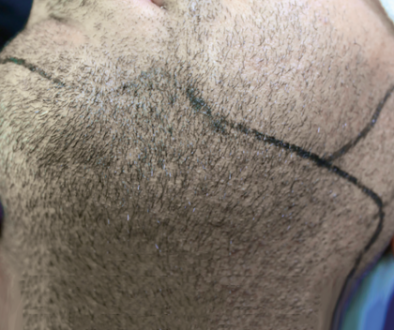Is Hair Transplant Surgery an Option for Me if I Can’t Take Propecia?
This question, asked by a member of our Hair Restoration Social Community and Discussion Forums, was answered by Coalition surgeon Dr. Cam Simmons:
I used Propecia for 4 months and it seemed to be having a positive effect. The problem was, however, I did experience sexual side effects. I wouldn’t describe them as severe but they were too problematic to continue the medication. I tried with generic Proscar a second time for about 6 weeks but similar problems occurred. Again, these have since resolved, but I would say it’s unfortunately the case that Propecia doesn’t seem to sit well with me!
So, I’m just wondering, without drugs, is hair restoration surgery still able to produce good results? I see many examples of patients who were at a stage V or VI on the Norwood Scale having incredible success with multiple procedures even when their heads are totally bald. I know there is always the risk of future hair loss without drugs but I’m assuming hair transplants can still, in some form, be an option?
It is good that you are planning for the future!
After Propecia (finasteride), Rogaine (minoxidil) 5% has the most evidence for fighting hair loss. Usually minoxidil slows hair loss but doesn’t stop it. While most patients find that finasteride alone works better than minoxidil alone, a few respond better to minoxidil. The better hair you have to begin with the better your chance that minoxidil will help slow your balding.
Some hair restoration physicians believe in laser hair treatment and/or platelet rich plasma (PRP) but I am sitting on the fence until better studies are done.
Perhaps the most difficult task in hair transplantation is predicting someone’s eventual hair loss pattern. I tend to plan for the worst and hope for the best. Usually, the younger the patient notices hair loss, the more rapid their hair loss tends to be and the longer they have to lose more hair. That is why most hair transplant doctors tend to be cautious and conservative about hair transplantation for young men. If a man has kept a lot of hair into his 40s or older, his is much less likely to lose a lot of hair and to need a lot of grafts.
Some men use a combination of hair transplantation and medical hair loss treatment, others choose to use medications alone or hair transplantation alone, and still others let nature take its course.
With modern hair transplantation, Norwood 6 or less patients can usually get good results if they transplant enough follicular unit grafts. Norwood 7 patients who choose hair transplantation most often do not have enough scalp donor hair to cover the entire balding area well and have to either sacrifice some density, some coverage, or some of each.
Dr. Cam Simmons MD ABHRS
—-
David – aka TakingThePlunge
Assistant Publisher and Forum Co-Moderator for the Hair Transplant Network, the Hair Loss Learning Center, the Hair Loss Q&A Blog, and the Hair Restoration Forum
Get Proven Hair Loss Treatments at the Best Prices by visiting our new Online Hair Loss Product Store
Technorati Tags: Propecia, Proscar, hair restoration, Norwood Scale, bald, hair loss, hair transplants, finasteride, Rogaine, minoxidil, balding, laser hair treatment, platelet rich plasma, PRP, hair transplantation, hair transplant, hair loss treatment, follicular unit grafts



